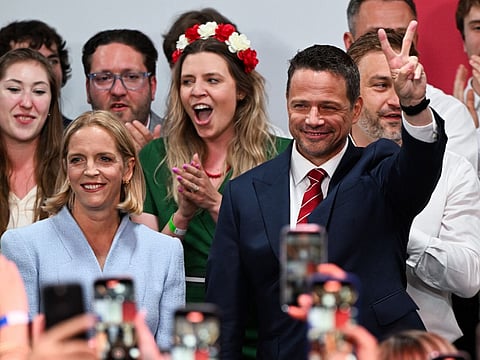Pro-Trump Nationalist Karol Nawrocki wins Poland’s presidential election
Nawrocki managed to close what had been a formidable lead by Trzaskowski in polls

A nationalist candidate backed by Donald Trump won Poland's presidential election, defeating the centrist mayor of Warsaw in a blow to the country's pro-European Union government.
Karol Nawrocki, a conservative historian and former boxer, won 50.9per cent, while Rafal Trzaskowski took 49.1per cent, according to Bloomberg News calculations based on data from 100per cent of precincts reported by the electoral commission.
In months of campaigning, the nationalist managed to close what had been a formidable lead by Trzaskowski in polls. The ballot is likely to determine whether one of the EU's fastest-growing economies and one of NATO's biggest defense spenders remains a reliable partner within the 27-member bloc, which is under mounting pressure from Trump's tariffs and Russia's threat to the east.
The narrow margin laid bare the polarization that's gripped the nation of 37 million, with issues such as migration, abortion and European integration sharply dividing voters. Nawrocki dismissed an early exit poll that showed Trzaskowski in the lead.
"We will wake up tomorrow with President Karol Nawrocki," the nationalist told supporters soon after polls closed on Sunday.
Nawrocki received help from the White House, having visited Trump briefly in the Oval Office last month. On a visit to Poland last week, US Homeland Security Secretary Kristi Noem urged Poles to vote for Nawrocki to ensure the country enjoys close ties with Trump.
At stake is the agenda of Prime Minister Donald Tusk, whose coalition ousted Poland's nationalists in 2023. Their eight years in power brought scrutiny from Brussels over the rule of law and raised questions about the nation's allegiance to the liberal West. A Nawrocki win could jeopardize Tusk's ambition to return Warsaw to the EU mainstream and maintain bloc funding.
Tusk's program has been stalled by outgoing President Andrzej Duda, a nationalist ally. Nawrocki told his supporters that his victory would amount to a check on Tusk's "monopoly" on power, which "takes away our great dreams and takes away our aspirations."
The vote had effectively become a referendum on Poland's future, including its role in Europe, women's rights, national identity and assistance to neighboring Ukraine.
The two candidates encapsulated the nation's divide: Trzaskowski, the polyglot son of a jazz musician, against Nawrocki, who heads the Institute for National Remembrance, which investigates Nazi and communist-era crimes.
A political newcomer, Nawrocki spent the campaign touting his core Catholic values while railing against migration and the EU's attempts to fight climate change. His campaign was dogged by allegations over a property purchase from an elderly seller and his participation in arranged fights between soccer hooligans.
The turnout was 71.3per cent, compared with a record 74.4per cent during parliamentary elections two years ago and 68.2per cent in the last presidential runoff in 2020.
While political power is held by the prime minister, Poland's president can veto legislation, nominates the central bank governor and leads the country's armed forces. The head of state is elected to a five-year term and is limited to two terms.
The ballot could expose further cracks in Tusk's coalition and energize Nawrocki's backers in the populist the Law & Justice party as well as surging far-right factions ahead of the 2027 parliamentary elections.
It's also a reality check for revved-up Polish assets, which have broadly rallied since Tusk's alliance won power two years ago. Warsaw's WIG20 stock index jumped 61per cent in dollar terms since the last parliamentary election, while government bonds returned 28per cent, most among emerging markets after South Africa and Thailand.
While Tusk is admired abroad as the man who took on populism and won, his popularity at home has been waning because of disillusionment over his ability to deliver.
Sign up for the Daily Briefing
Get the latest news and updates straight to your inbox



